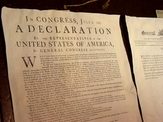Constitutional Denial and the Entrenched Understanding of American Constitutionalism
 It is ironic that a constitutional culture—derived from as wonderfully revolutionary document as the Declaration of Independence—has become so rooted in denial about the flaws in American constitutionalism. An encrusted and entrenched understanding of constitutional possibilities has developed upon which constitutional scholarship—both jurisprudential and empirical—founders. What constitutes this entrenched understanding? Here are some, but by no means all, of the factors involved: (1) the tacit assumption that the American Constitution is flawless or at least as good as constitutions can get, and as a result (2) the perennial dismissal of the horrors associated with the Constitution, for example, that some of its major features such as the electoral college and the Senate were designed in large measure to protect slavery, (3) self-government is dangerous or at least suspect and leaving political decisions to the masses can result in mobocracy, which the U.S. Constitution is specifically designed to prevent, (4) preventing the adverse effects of mobocracy requires resting constitutional interpretation in a governmental body insulated from the direct influence of either the electorate or its representatives, (5) that in contemporary polities the distinction between republicanism and democracy is as important as it was in 1787, and my favorite (5) courts are best suited by expertise and experience to enforce constitutional limits against encroachment from the elected branches.
It is ironic that a constitutional culture—derived from as wonderfully revolutionary document as the Declaration of Independence—has become so rooted in denial about the flaws in American constitutionalism. An encrusted and entrenched understanding of constitutional possibilities has developed upon which constitutional scholarship—both jurisprudential and empirical—founders. What constitutes this entrenched understanding? Here are some, but by no means all, of the factors involved: (1) the tacit assumption that the American Constitution is flawless or at least as good as constitutions can get, and as a result (2) the perennial dismissal of the horrors associated with the Constitution, for example, that some of its major features such as the electoral college and the Senate were designed in large measure to protect slavery, (3) self-government is dangerous or at least suspect and leaving political decisions to the masses can result in mobocracy, which the U.S. Constitution is specifically designed to prevent, (4) preventing the adverse effects of mobocracy requires resting constitutional interpretation in a governmental body insulated from the direct influence of either the electorate or its representatives, (5) that in contemporary polities the distinction between republicanism and democracy is as important as it was in 1787, and my favorite (5) courts are best suited by expertise and experience to enforce constitutional limits against encroachment from the elected branches.There are alternative and more complete characterizations of this entrenched understanding, but my goal here is simply to present a rough approximation of its content. The important point is that this entrenched understanding more often than not is subliminal and as such
 typically functions as a hidden obstacle to impartially evaluating alternative conceptions of constitutionalism. For instance, in arguing against judicial supremacy, it is virtually impossible to overcome the entrenched understanding’s tacit assumption that no democracy is mature enough to empower the legislature to have the final say about constitutional meaning. Judicial supremacy is considered an unanalyzed, intuitive given which any theory of constitutionalism must accommodate. The result is the subliminal rejection of honestly considering alternatives. Rejecting such alternatives out of hand, as the entrenched understanding insists, renders significant constitutional change virtually impossible. No democratic constitutional system should be so self-satisfied.
typically functions as a hidden obstacle to impartially evaluating alternative conceptions of constitutionalism. For instance, in arguing against judicial supremacy, it is virtually impossible to overcome the entrenched understanding’s tacit assumption that no democracy is mature enough to empower the legislature to have the final say about constitutional meaning. Judicial supremacy is considered an unanalyzed, intuitive given which any theory of constitutionalism must accommodate. The result is the subliminal rejection of honestly considering alternatives. Rejecting such alternatives out of hand, as the entrenched understanding insists, renders significant constitutional change virtually impossible. No democratic constitutional system should be so self-satisfied.










0 Comments:
Post a Comment
<< Home